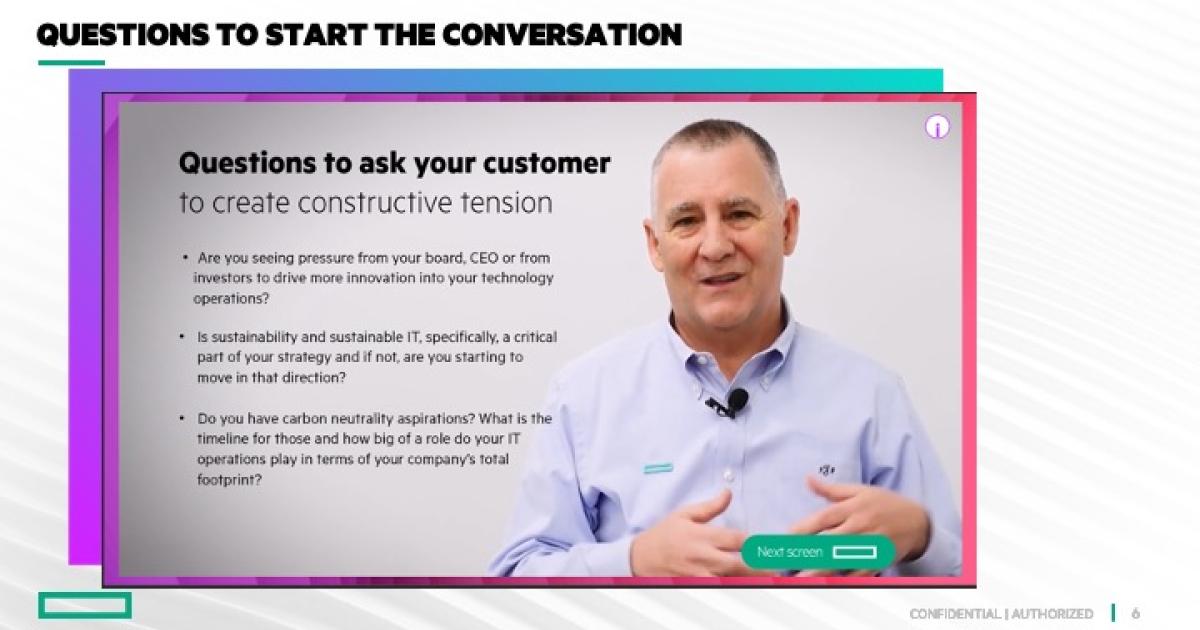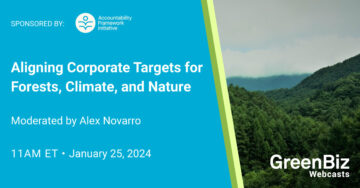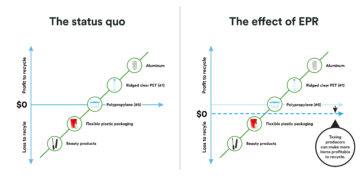
Five years ago, when potential customers started asking questions about the carbon footprints for Hewlett Packard Enterprise products and services, members of the sustainability team were called in. Their mission: Respond authoritatively; uncover customer pain points related to things such as reducing and reporting on carbon emissions; and illustrate how HPE products meet those needs.
HPE tracked the financial impact of those conversations on helping close deals. The results were relatively modest on an annual basis until fiscal year 2022 (ended Oct. 31). That’s when the value of contracts driven by the sustainability team’s efforts to talk up energy efficiency, circularity and other related features reached $1.3 billion for the year.
That was just a small slice of HPE’s overall $28.5 billion in revenue for fiscal year 2022, but it’s a 400 percent increase compared with 2018 results, according to HPE’s latest ESG progress report. Then, interest in sustainability discussions grew dramatically last year, far beyond what the dedicated specialists on HPE’s sustainability team could handle, according to Monica Batchelder, HPE’s chief sustainability officer for 10 months. So the company started a program to train its salespeople on the importance of corporate sustainability for customers and prospects, as well as how HP technologies can play a role in meeting sustainability goals.
What customers need to know about sustainability
Over the past two years, Batchelder said more IT customers have begun requesting information about how certain technology investments can help with corporate net-zero targets — how they can inflate or reduce carbon footprints — as well as how they might be used to measure ESG-related metrics and manage them.
“Particularly in industries like banking, where they have huge data centers, a huge IT footprint,” Batchelder said. “They’re like, ‘The [chief information officer’s] got this sustainability KPI. We’re not sustainability people. We don’t even understand greenhouse gas emissions. Help us understand how we quantify this, how we put a strategy in place and how we report on it.’”
For sectors outside manufacturing, she said: “Your IT estate is probably your biggest source of operational emissions or at least on your energy draw.”
Antoine Poincare, vice president of The Climate School, a training initiative offered by consulting firm Axa Climate, said corporate sustainability learning and development efforts are starting to include a sales agenda. “Every major tech firm is now starting to roll out technology designed for sustainability, and they need their salespeople to discuss these products with confidence,” he said.
The need to do this isn’t unique to tech firms, Poincare said, noting that as more business-to-business companies seek to report on the carbon footprints of their supply chains, sales training will become more common across all industries, even partly to remain competitive.
Turning salespeople into sustainability pros: 4 modules
What does this training look like? HPE launched voluntary online classes in its fiscal year 2023 to turn pre-sales, sales and customer engagement employees into advocates for what it calls “sustainable IT.” (The program is also available to the network of sales partners who sell HPE products. )
The training videos include more than nine hours of technical sessions as well as four “sales pro” modules that outline best practices for customer discussions. The modules were created at HPE and the individuals featured include top HPE technologists and experts from across the company.
In a kick-off sales pro module, HPE Chief Sales Officer Heiko Meyer talks up why sustainability is important for HPE and its customers, as well as why it’s an opportunity for revenue growth.
In a second module, the company’s chief technologist for sustainable transformation, John Frey, identifies terms such as “ESG” and “circular economy,” the use of which might suggest an IT professional is open to a sustainability product discussion. He describes pain points customers might experience, such as rigid business models or not enough industry-specific competitive information to make educated choices about sustainability strategy, and cites potential objections, like costs. He also provides the following questions that salespeople might consider asking prospects:
- Is sustainability, and specifically sustainable IT, a critical part of your strategy and, if not, are you starting to move in that direction?
- Do you have carbon neutrality aspirations?
- What is the timeline for those and how big of a role do your IT operations play in terms of your company’s total footprint?
In the third module, Batchelder offers best practices for delivering the HPE sustainability narrative, including ESG market insights and case studies involving other HPE customers.
Finally, the fourth module in the series is a 13-minute sample pitch for its cloud service, GreenLake, which can reduce an organization’s energy costs by as much as 30 percent. Additional background materials include an interview with HPE’s CEO, Antonio Neri, about its ESG strategy and training videos about topics like the five largest sources of greenhouse gas emissions.
The modules will be refreshed later this year with updates and new courses, and HPE plans to create a “badging” program that designates individuals as specialists on sustainability topics.
How salespeople will help HPE get to net zero
Interest has already far exceeded HPE’s expectations for participation. As of late July, close to 2,500 sales, presales, channel partners and other employees had completed the sales pro modules. That far outpaces the average of 1,000 learners annually for similar non-mandatory HPE sales training initiatives, according to Batchelder. “Several thousand more” people attended in-person trainings, she said.
Batchelder is encouraged. “Salespeople aren’t going to take this unless their customers are asking about it, and that they know they need to equip themselves to respond to those questions,” she said.
HPE salespeople are incentivized on product sales, regardless whether the products have a sustainability focus. Compensation for its executive committee is tied to the company’s performance against its net-zero goals — based on goals specific to each division, such as meeting certain design goals for energy efficiency or the use of recycled content. HPE’s goal is to cut operational emissions by 70 percent by 2030, based on a 2020 baseline.
“For us, I think [this sales training] is particularly crucial because two-thirds of our carbon footprint is downstream customer use, right?” Batchelder said. “That ability to influence customer behavior and engage with customers even before the sale of the product is going to be increasingly important for companies to get to net zero.”
Is your company equipping its sales teams to pitch sustainability? What has been the impact on revenue? Tell me your story at [email protected].
- SEO Powered Content & PR Distribution. Get Amplified Today.
- PlatoData.Network Vertical Generative Ai. Empower Yourself. Access Here.
- PlatoAiStream. Web3 Intelligence. Knowledge Amplified. Access Here.
- PlatoESG. Automotive / EVs, Carbon, CleanTech, Energy, Environment, Solar, Waste Management. Access Here.
- PlatoHealth. Biotech and Clinical Trials Intelligence. Access Here.
- ChartPrime. Elevate your Trading Game with ChartPrime. Access Here.
- BlockOffsets. Modernizing Environmental Offset Ownership. Access Here.
- Source: https://www.greenbiz.com/article/how-sustainability-training-helped-hpe-land-13-billion-it-contracts
- :has
- :is
- :not
- :where
- $UP
- 000
- 1
- 10
- 2018
- 2020
- 2022
- 2023
- 2030
- 30
- 31
- 500
- 70
- a
- ability
- About
- about IT
- According
- across
- Additional
- advocates
- against
- agenda
- ago
- All
- already
- also
- an
- and
- annual
- Annually
- ARE
- AS
- At
- available
- average
- AXA
- background
- Banking
- based
- Baseline
- basis
- BE
- because
- become
- been
- before
- begun
- behavior
- BEST
- best practices
- Beyond
- Big
- Biggest
- Billion
- business
- business models
- business-to-business
- but
- by
- called
- Calls
- CAN
- carbon
- carbon emissions
- carbon footprint
- Carbon Neutrality
- case
- Case Studies
- Centers
- ceo
- certain
- chains
- Channel
- chief
- choices
- circular economy
- classes
- Climate
- Close
- Cloud
- committee
- Common
- Companies
- company
- Company’s
- compared
- Compensation
- competitive
- Completed
- confidence
- Consider
- consulting
- content
- contracts
- conversations
- Corporate
- Costs
- could
- courses
- create
- created
- critical
- crucial
- customer
- customer behavior
- Customer Engagement
- Customers
- Cut
- data
- data centers
- Deals
- dedicated
- delivering
- Design
- designed
- Development
- direction
- discuss
- discussion
- discussions
- Division
- do
- does
- Dont
- dramatically
- draw
- driven
- each
- economy
- efficiency
- efforts
- Emissions
- employees
- encouraged
- energy
- energy efficiency
- engage
- engagement
- enough
- Enterprise
- ESG
- estate
- Ether (ETH)
- Even
- Every
- exceeded
- executive
- expectations
- experience
- experts
- far
- featured
- Features
- financial
- Firm
- firms
- Fiscal
- five
- Focus
- following
- Footprint
- For
- four
- Fourth
- from
- GAS
- get
- goal
- Goals
- going
- greenhouse gas
- Greenhouse gas emissions
- grew
- Growth
- had
- handle
- Have
- he
- help
- helping
- HOURS
- How
- HP
- HTML
- HTTPS
- huge
- i
- identifies
- if
- Impact
- importance
- important
- in
- incentivized
- include
- Including
- Increase
- increasingly
- individuals
- industries
- industry-specific
- influence
- information
- Initiative
- initiatives
- insights
- interest
- Interview
- into
- Investments
- involving
- IT
- ITS
- John
- July
- just
- kick-off
- Know
- largest
- Last
- Last Year
- Late
- later
- launched
- learning
- least
- Led
- like
- Look
- look like
- major
- make
- manage
- manufacturing
- Market
- market insights
- materials
- me
- measure
- Meet
- meeting
- Members
- Metrics
- Meyer
- might
- Mission
- models
- modest
- module
- Modules
- months
- more
- move
- much
- NARRATIVE
- Need
- needs
- net
- net-zero
- network
- New
- noting
- now
- Oct
- of
- offered
- Offers
- Officer
- on
- online
- open
- operational
- Operations
- Opportunity
- or
- Other
- our
- out
- outline
- outside
- overall
- Pain
- Pain points
- part
- participation
- particularly
- partners
- past
- People
- percent
- performance
- Pitch
- Place
- plans
- plato
- Plato Data Intelligence
- PlatoData
- Play
- points
- potential
- potential customers
- practices
- president
- Pro
- probably
- Product
- Products
- Products and Services
- professional
- Program
- Progress
- PROS
- prospects
- protected
- provides
- put
- Questions
- reached
- reduce
- reducing
- Regardless
- related
- relatively
- remain
- report
- Reporting
- Respond
- Results
- revenue
- revenue growth
- right
- rigid
- Role
- Roll
- s
- Said
- sale
- sales
- sales teams
- Salespeople
- School
- Second
- Sectors
- Seek
- sell
- Series
- service
- Services
- sessions
- several
- she
- similar
- Slice
- small
- So
- Source
- Sources
- specialists
- specific
- specifically
- started
- Starting
- Story
- Strategy
- studies
- such
- suggest
- supply
- Supply chains
- Sustainability
- sustainable
- Take
- Talk
- Talks
- targets
- team
- teams
- tech
- Technical
- Technologies
- technologist
- technologists
- Technology
- tell
- terms
- than
- that
- The
- their
- Them
- themselves
- then
- These
- they
- things
- Think
- Third
- this
- this year
- those
- thousand
- Tied
- timeline
- to
- top
- Topics
- Total
- Train
- Training
- trainings
- Transformation
- TURN
- two
- two-thirds
- uncover
- understand
- unique
- until
- Updates
- us
- use
- used
- value
- vice
- Vice President
- Videos
- voluntary
- was
- we
- WELL
- were
- What
- when
- whether
- which
- WHO
- why
- will
- with
- year
- years
- you
- Your
- zephyrnet
- zero








